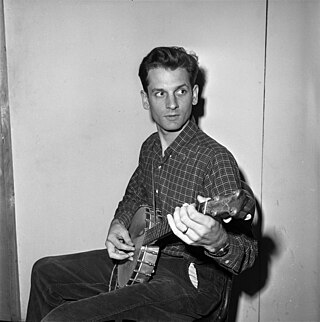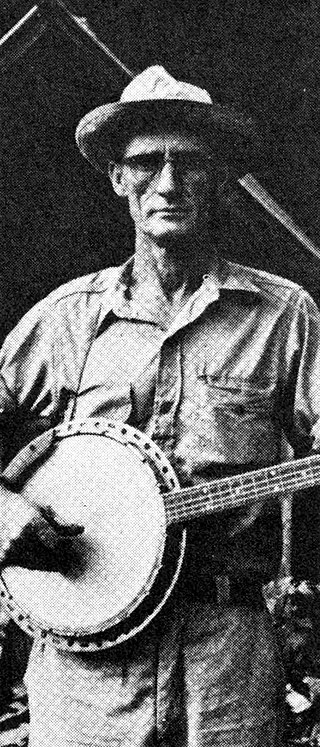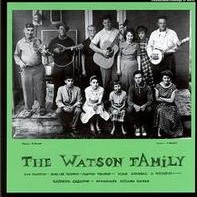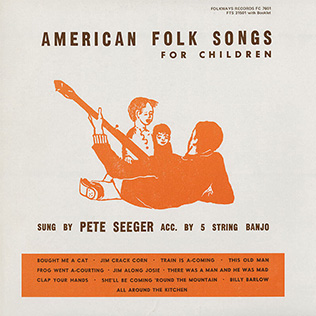
Guy Hughes Carawan Jr. was an American folk musician and musicologist. He served as music director and song leader for the Highlander Research and Education Center in New Market, Tennessee.

Moran Lee "Dock" Boggs was an American old-time singer, songwriter and banjo player. His style of banjo playing, as well as his singing, is considered a unique combination of Appalachian folk music and African-American blues. Contemporary folk musicians and performers consider him a seminal figure, at least in part because of the appearance of two of his recordings from the 1920s, "Sugar Baby" and "Country Blues", on Harry Smith's 1952 collection Anthology of American Folk Music. Boggs was first recorded in 1927 and again in 1929, although he worked primarily as a coal miner for most of his life.

The New Lost City Ramblers, or NLCR, was an American contemporary old-time string band that formed in New York City in 1958 during the folk revival. Mike Seeger, John Cohen and Tom Paley were its founding members. Tracy Schwarz replaced Paley, who left the group in 1962. Seeger died of cancer in 2009, Paley died in 2017, and Cohen died in 2019. NLCR participated in the old-time music revival, and directly influenced many later musicians.

Mike Seeger was an American folk musician and folklorist. He was a distinctive singer and an accomplished musician who played autoharp, banjo, fiddle, dulcimer, guitar, mouth harp, mandolin, dobro, jaw harp, and pan pipes. Seeger, a half-brother of Pete Seeger, produced more than 30 documentary recordings, and performed in more than 40 other recordings. He desired to make known the caretakers of culture that inspired and taught him.
John Cohen was an American musician, photographer and film maker who performed and documented the traditional music of the rural South and played a major role in the American folk music revival. In the 1950s and 60s, Cohen was a founding member of the New Lost City Ramblers, a New York-based string band. Cohen made several expeditions to Peru to film and record the traditional culture of the Q'ero, an indigenous people. Cohen was also a professor of visual arts at SUNY Purchase College for 25 years.

Bascom Lamar Lunsford was a folklorist, performer of traditional Appalachian music, and lawyer from western North Carolina. He was often known by the nickname "Minstrel of the Appalachians."

Roscoe Holcomb, was an American singer, banjo player, and guitarist from Daisy, Kentucky. A prominent figure in Appalachian folk music, Holcomb was the inspiration for the term "high, lonesome sound," coined by folklorist and friend John Cohen. The "high lonesome sound" term is now used to describe bluegrass singing, although Holcomb was not, strictly speaking, a bluegrass performer.
Harley Allen, better known as Red Allen, was an American bluegrass singer and guitarist known for his powerful tenor voice.
Stephen Wade is an American folk musician, writer, and researcher.

Frank Hamilton is an American folk musician, collector of folk songs, and educator. He co-founded the Old Town School of Folk Music in Chicago, Illinois in 1957. As a performer, he has recorded for several labels, including Folkways Records. He was a member of the folk group The Weavers in the early 1960s, and appeared at the first Newport Folk Festival in 1959. He was the house musician – playing guitar and other folk instruments – for Chicago's Gate of Horn, the nation's first folk music nightclub. After many years of teaching, playing, and singing in California he married a third time, and with his wife relocated to Atlanta, where he performs on banjo, guitar, ukulele, voice, and other instruments and co-founded the Frank Hamilton School in 2015.
"I Wish I Was a Mole in the Ground" is a traditional American folk song. It was most famously recorded by Bascom Lamar Lunsford in 1928 for Brunswick Records in Ashland, Kentucky. Harry Smith included "I Wish I Was a Mole in the Ground" on his Anthology of American Folk Music released by Folkways Records in 1952. The notes for Smith's Anthology state that Lunsford learned this song from Fred Moody, a North Carolina neighbor, in 1901.
Ola Belle Reed was an American Appalachian folk singer, songwriter and banjo player.

The Watson Family is the title of a recording by American folk music artist Doc Watson and The Watson Family, originally released in 1963.
"Cumberland Gap" is an Appalachian folk song that likely dates to the latter half of the 19th century and was first recorded in 1924. The song is typically played on banjo or fiddle, and well-known versions of the song include instrumental versions as well as versions with lyrics. A version of the song appeared in the 1934 book, American Ballads and Folk Songs, by folk song collector John Lomax. Woody Guthrie recorded a version of the song at his Folkways sessions in the mid-1940s, and the song saw a resurgence in popularity with the rise of bluegrass and the American folk music revival in the 1950s. In 1957, the British musician Lonnie Donegan had a No. 1 UK hit with a skiffle version of "Cumberland Gap".
Roger Sprung was an American banjo player and teacher best known for introducing authentic bluegrass banjo picking styles to the folk music community in the north and for the eclectic manner in which he adapted bluegrass banjo techniques to music of other genres. His 1963 album Progressive Bluegrass may have been the first use of that title, later applied to a subgenre of bluegrass music by him and others.

On the Road is a live album by the bluegrass band Country Gentlemen, recorded in 1963. It continues to offer some of the best collection of songs by the first classic lineup of the group. The album originally contained 13 songs, selection from 2 concerts in 1962 and 1963. In 2001, Smithsonian Folkways re-released the album as a CD with 6 bonus tracks, recorded at Carnegie Hall on September 16, 1961.The album offers blend of folk and bluegrass music, while expanding compositions of Bill Monroe, Ralph Stanley as well as traditional songs to the more progressive bluegrass sound.
Folkways Records was a record label founded by Moses Asch that documented folk, world, and children's music. It was acquired by the Smithsonian Institution in 1987 and is now part of Smithsonian Folkways.

American Folk Songs for Children is a studio album released by Pete Seeger in 1953 by Folkways Records. It was Seeger's first solo album.
Jeff Place is the Grammy Award-winning writer and producer and a curator and senior archivist with the Smithsonian Center for Folklife and Cultural Heritage. He has won three Grammy Awards and six Indie Awards.
Virginia Mae "Ginni" Clemmens was an American folk musician and songwriter in the genres of women's music and children's music. She was inducted into the Chicago LGBT Hall of Fame in 2021.









